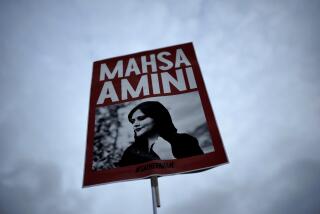Amnesty International: Islamic State carrying out ethnic cleansing
The militant group Islamic State, which has seized large areas of northern Iraq in recent months, has “carried out ethnic cleansing on a historic scale,” according to a report released on Tuesday by the monitoring group Amnesty International.
The 26-page report, based on field investigations and hundreds of interviews with witnesses and victims of the Al Qaeda offshoot, is a litany of massacres and abductions.
Much of the northern Iraqi province of Nineva, with a multiethnic population of 3.2 million that includes Christians, Yazidis, Turkmen and Kurds, is now under the control of Islamic State. The militants espouse a particularly harsh interpretation of Islamic sharia law that views non-Muslims and Shiite Muslims as infidels.
The Yazidis, members of the heterodox offshoot of Zoroastrianism, have elicited the particular ire of Islamic State fighters, who stormed their villages in the Sinjar region about 70 miles east of Mosul last month.
According to the report, “hundreds, possibly thousands” of Yazidi women and children were abducted soon after the takeover, while the men who resisted were shot in the back of the head as an example to others. Those who survived did so because of chance, some sustaining superficial bullet wounds or pretending they were dead under piles of their fallen brethren.
Khaled Mrad, a 32-year-old survivor from the town of Kocho, is believed to have lost seven brothers in the killings.
“They shot at us for several minutes and then they left. I was shot three times, twice in the left arm and once in the left hip,” he said in an interview with Amnesty International. “After they left, another man ... and I got up. All the others were dead and dying.”
The lesson was heeded by communities in Nineva: An estimated 830,000 people fled, streaming into the relative safety of areas under the control of the Kurdish Regional Government in nearby Irbil and Dohuk. Those unable to do so instead fled to Mt. Sinjar, prompting an international effort to drop supplies and evacuate survivors via helicopter.
Although minority communities have suffered bouts of sectarian-driven violence in the past, what was new about this latest wave “was the scale of it, the speed with which it has happened,” according to Donatella Rovera, senior crisis response advisor for Amnesty International, contacted by phone in Irbil.
“The Islamic State was able to ethnically cleanse them in the area, literally change the demographic map of northern Iraq in a few weeks,” said Rovera, who is the lead investigator in the report. “And they have gone about it in a very systematic way ... and were able to seize large areas virtually unopposed.”
Human Rights Watch, another nongovernmental watchdog group, reported that Islamic State has used cluster munitions in at least one location: in the town of Ayn Al-Arab, 80 miles northeast of Aleppo city. The use of such ordnance leaves many unexploded bomblets on the battlefield, posing a serious risk to civilians long after hostilities have ceased.
The munitions, which eject smaller explosive bomblets over an area, were banned in 2010 through the Convention on Cluster Munitions, though many countries -- including the U.S. and China -- have not yet ratified the agreement.
The Syrian government has been condemned for utilizing cluster bombs, which Human Rights Watch claims were used as recently as Aug. 21. Human Rights Watch said it could not determine how the Islamic State acquired the munitions. The group also holds extensive territory in Syria.
“The use of cluster munitions by nonstate actors such as the Islamic State shows the urgent need for Syria and all nations that have not yet done so to join the ban on cluster munitions and destroy their stockpiles,” the report says.
Bulos is a special correspondent.
More to Read
Start your day right
Sign up for Essential California for news, features and recommendations from the L.A. Times and beyond in your inbox six days a week.
You may occasionally receive promotional content from the Los Angeles Times.







